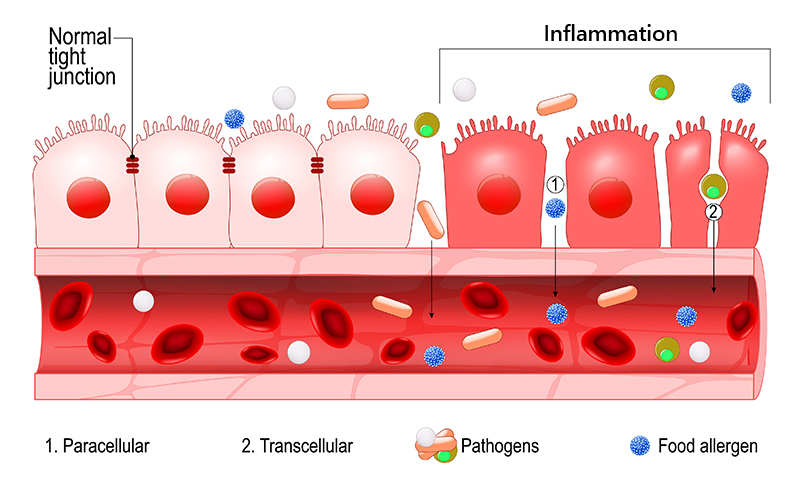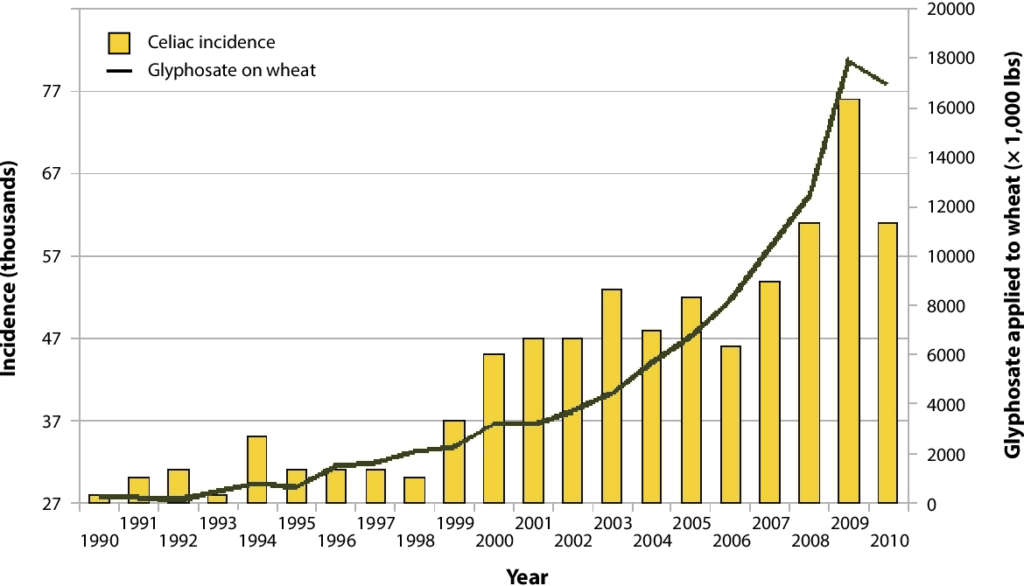
Background:
Glyphosate (eg, Roundup) is the most widely used herbicide in the world. In active use since 1974, glyphosate is found in our air, water, soil, and food. Glyphosate is quite robust to degradation and it distributes into the tissues with a half-life of 15 hours. Glyphosate and it’s main metabolite aminomethylphosphonic acid (AMPA), are not removed by washing or cooking adding to its accumulation. The intestines act as the primary barrier for absorption and a growing number of studies show its effect on the intestines.
Glyphosate and Gut Barrier Integrity
A recent study (1) shows that glyphosate and its metabolites might negatively affect the epithelial tight junctions, which are essential for maintaining the integrity of the gut barrier. Damage to these junctions could lead to increased gut permeability, often referred to as “leaky gut,” which could allow bacteria and other substances to pass from the gut into the bloodstream, triggering inflammation.

Celiac disease, or gluten intolerance, are autoantibodies to undigested fragments of gliadin and induces intestinal inflammation. Data shows that the incidence of Celiac and glyphosate application significantly coincides (2). Data is emerging that food allergies and glyphosate may be linked (3).

Glyphosate and Pathogenic Bacteria
Another study from 2013 suggested that glyphosate could potentially favor the growth of harmful bacteria. In this study, the researchers found that glyphosate was non-toxic to several species of the most prevalent Salmonella and E. coli strains, while it could inhibit the growth of beneficial bacteria like Enterococcus, Bacillus, and Lactobacillus (4).
References
- Van Bruggen AHC, He MM, Shin K, Mai V, Jeong KC, Finckh MR,Morris JG Jr. Environmental and health effects of the herbicide glyphosate. SciTotal Environ. 2018 Mar;616-617:255-268. doi: 10.1016/j.scitotenv.2017.10.309.Epub 2017 Nov 5. PMID: 29117584.
- Samsel A, Seneff S. Glyphosate, pathways to modern diseases II:Celiac sprue and gluten intolerance. Interdiscip Toxicol. 2013 Dec;6(4):159-84.doi: 10.2478/intox-2013-0026. PMID: 24678255; PMCID: PMC3945755.
- Buchenauer L, Junge KM, Haange SB,Simon JC, von Bergen M, Hoh AL, Aust G, Zenclussen AC, Stangl GI, Polte T.Glyphosate differentially affects the allergic immune response acrossgenerations in mice. Sci Total Environ. 2022 Dec 1;850:157973. doi:10.1016/j.scitotenv.2022.157973. Epub 2022 Aug 11. PMID: 35963408.
- Shehata AA, Schrödl W, Aldin AA, Hafez HM, Krüger M. The effectof glyphosate on potential pathogens and beneficial members of poultrymicrobiota in vitro. Curr Microbiol. 2013 Apr;66(4):350-8. doi:10.1007/s00284-012-0277-2. Epub 2012 Dec 9. PMID: 23224412.
